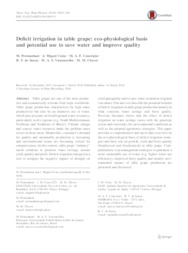Deficit irrigation in table grape: eco-physiological basis and potential use to save water and improve quality.
Deficit irrigation in table grape: eco-physiological basis and potential use to save water and improve quality.
Author(s): PERMANHANI, M.; COSTA, J. M.; CONCEIÇÃO, M. A. F.; SOUZA, R. T. de; VASCONCELOS, M. A. S.; CHAVES, M. M.
Summary: Table grapes are one of the most productive and economically relevant fruit crops worldwide. Table grape production characterizes by high water productivity but also by an intensive use of water, which puts pressure on local/regional water resources, particularly in dry regions (e.g. South Mediterranean, Northeast and Southeast of Brazil). Climate change and scarcer water resources make the problem more severe in those areas. Meanwhile, consumer’s demand for quality and sustainable production is increasing and environmental issues are becoming critical for competiveness. In this context, table grape ‘‘industry’’ needs solutions to promote water savings, sustain yield, quality and profit. Deficit irrigation emerged as a tool to mitigate the negative impact of drought on yield and quality and to save water in modern irrigated viticulture. Our aim is to describe the potential benefits of deficit irrigation in table grape production namely in what concerns water savings and berry quality. Previous literature shows that the effect of deficit irrigation on water savings varies with the genotype (scion and rootstock), the environmental conditions as well as the adopted agronomic strategies. This paper provides a comprehensive and up-to-date overview on the eco-physiological basis of deficit irrigation strategies and their role on growth, yield and berry quality (biophysical and biochemical) in table grape. Complementary crop management strategies to guarantee a more sustainable use of water (e.g. higher water use efficiency), improved berry quality and smaller environmental impact of table grape production are presented and discussed. Keywords Drought and heat stress Water use Stress eco-physiology Berry yield and quality Sustainable production
Publication year: 2016
Types of publication: Journal article
Unit: Embrapa Grape & Wine
Observation
Some of Embrapa's publications are published as ePub files. To read them, use or download one of the following free software options to your computer or mobile device. Android: Google Play Books; IOS: iBooks; Windows and Linux: Calibre.
Access other publications
Access the Agricultural Research Database (BDPA) to consult Embrapa's full library collection and records.
Visit Embrapa Bookstore to purchase books and other publications sold by Embrapa.

